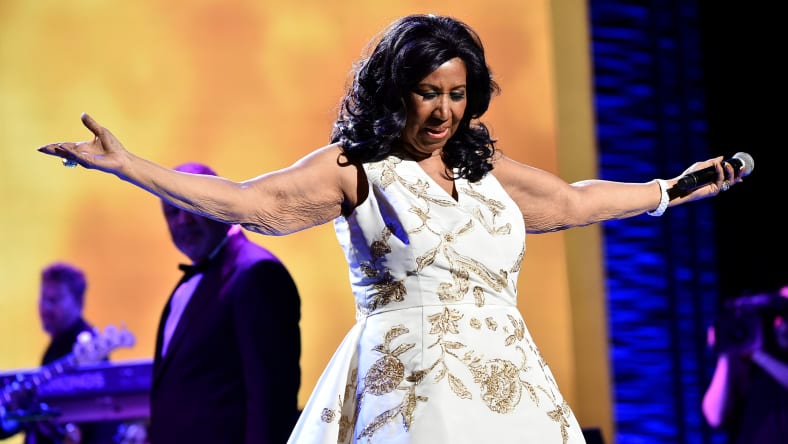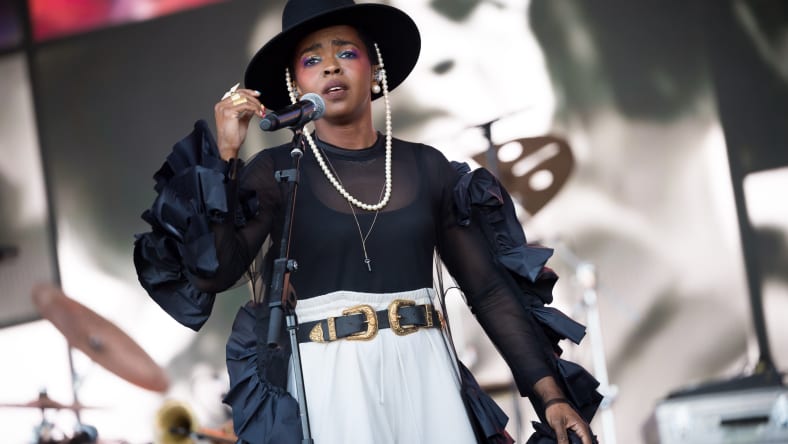25 years of ‘A Rose Is Still a Rose,’ Aretha Franklin’s last grand statement and Lauryn Hill’s first on her own
Editor’s note: The following article is an op-ed and the views expressed are the author’s own. Read more opinions on theGrio. Aretha The post 25 years of ‘A Rose Is Still a Rose,’ Aretha Franklin’s last grand statement and Lauryn Hill’s first on her own appeared first on TheGrio.

In honor of Black History Month, theGrio looks back at the 25th anniversary of Aretha Franklin’s final big hit, “A Rose Is Still a Rose,” its impact, and the magical collaboration between Franklin and Lauryn Hill.
Editor’s note: The following article is an op-ed and the views expressed are the author’s own. Read more opinions on theGrio.
Aretha Franklin was arguably the greatest singer to walk a turn on planet earth, but her legacy endures not just because of the power of her vocals.
When none of Franklin’s first albums or singles during her Columbia Records era were able to galvanize the record-buying public in the early 1960s, it was clear that her voice needed to be married to suitable material. Once she got to Atlantic Records in 1967 and recorded songs like “Respect” and “I Never Loved a Man (The Way I Love You),” she had found her way, beginning a reign for over three decades.
By 1998, R&B music had changed. Throughout that year, songs like Whitney Houston’s “Heartbreak Hotel”; Destiny’s Child’s “No, No, No”; Xscape’s “Softest Place on Earth”; Brandy and Monica’s “The Boy Is Mine”; and Deborah Cox’s “Nobody’s Supposed to Be Here” dominated Black radio.
Success in the 1990s was fickle for Franklin. Her one hit record was 1994’s “Willing to Forgive,” produced by then white-hot Kenny “Babyface” Edmonds. But in 1998, Franklin, who turned 56 that year, could still stand out among the younger singers. It was thanks to a song with a sound that no one had heard from her before; “A Rose Is Still a Rose.”
The song affirms hope in the face of adversity, betrayal, and innocence lost. Franklin tells the story of a young girl who’s taken advantage of by a man, causing her to alter her approach to life. Franklin’s dynamic vocal over a tight, funky, and opulent hip-hop arrangement became her last big hit and a sign of things to come from a superstar in the making.
The song’s immediate impact on listeners was mainly due to the titanic artistic collision between Franklin and the song’s writer and producer, Lauryn Hill. Hill was a budding star from the rap trio The Fugees. Their rendition of “Killing Me Softly” propelled their 1996 album “The Score” to multi-platinum status, indicating that Hill had superstar potential as a performer who could sing and rap with equal virtuosity.
On “A Rose Is Still a Rose,” Hill would provide Franklin with a hip-hop soul canvas to ensure they both could shine. Franklin showed the crowd she could sing over anything and make it a hit, and Hill unleashed her writing and production chops.
Franklin, a brilliant songwriter herself, was also an exquisite interpreter. She could express the multifaceted aspects and points of view of love, relationships, and heartbreak.
Usually, in her songs, Franklin was the protagonist in her own story, especially regarding heartache. In songs like “Chain of Fools,” she said: “You told me to leave you alone/My father said, ‘Come on home’/My doctor said, ‘Take it easy’/Oh, but your lovin’ is much too strong.”

“I Never Loved a Man (The Way I Love You)” begins with “You’re a no good, heartbreaker, you’re a liar, and you’re a cheat.”
What’s genius about “A Rose Is Still a Rose” is that Hill propped up Franklin as the sage woman to teach the youth. It made her the neighborhood auntie who advises the young ladies who need it most because she’s been in their shoes already. This vantage point is why the public gravitated to it as much as they did.
The song had tight, compact funk that would sound good for a rapper but flourished with tactical piano chords from James Poyser and searing string arrangements. Franklin never sounded out of touch over the hip-hop style production and sounded quite natural singing lines like “steal her honey, then forget her” or “tossin’ and flossin’.” Franklin’s comfort on the track was also due to Hill coming into her own as a songwriter.
Hill always had an uncanny way with words. Aside from her otherworldly raps on songs like “How Many Mics” and “Zealots,” she wrote “The Sweetest Thing” in 1997. That song featured vivid phrases like “Sweet prince of the ghetto, your kisses taste like amaretto.” In 1999, in Mary J. Blige’s “All That I Can Say,” Hill wrote, “genuine, seraphim, sweeter than cinnamon, heaven-sent gentleman, sent him here for loving him.”
“A Rose Is Still a Rose” lyrically informs what the world would hear from Hill months later with her solo single, “Doo Wop (That Thing).” The sentiment of talking to a scorned woman, betrayed by a deceitful man who used her for her body, giving her sage advice to be herself after she alters her appearance and defenses in light of her hurt.
“Now the rose is scorned/She wears her thorns/Tryin’ to forget about you.” Franklin’s two passages at that phrase in the two pre-choruses are first cautionary and then armed. Her ability to emote with low notes during the verses and pull out high cries displayed dynamics she wrote the book on decades before.

The wordplay and phrasing she would employ on “Rose” fused a world-worn sense of wisdom and spirituality, later fleshed out to significant effect on “The Miseducation of Lauryn Hill,” which meshed well with Franklin’s gospel background. The song starts with Franklin speaking a monologue:
“Listen dear; I realize that you’ve been hurt, deeply, because I’ve been there; but regardless to who, what, why, when, and where, we’re all precious in His sight.” The last line evokes the gospel leanings that were Franklin’s foundation as a child and what often separated her from her peers.
Hill’s sample usage of Edie Brickell & New Bohemians’ 1988 song “What I Am” was multi-tiered. On the one hand, it’s a mantra that reinforces the message that you are the same beautiful individual you once were. On the other hand, it works as a play on “I Am that I Am,” how God referred Himself to Moses at the burning bush in the book of Exodus. The affirmation of God’s presence and guidance is still there for the young girl to seek hope and inspiration.
“A Rose Is Still a Rose” was Franklin’s final top 40 hit on the Billboard Hot 100 and the final of her 52 top 10 hits on the Billboard R&B charts, peaking at number five. It was nominated at the 41st Grammy Awards for Best Female R&B Vocal Performance, leading its eponymous album to earn a Best R&B Album nod.
It was an unexpected and well-earned hit and send-off for Franklin after decades of dominance. For Hill, it was an appetizer for the musical phenomenon that she would soon become just months later with the release of “Miseducation,” which helped earn her five Grammy Awards.
For fans, “A Rose Is Still a Rose” is a classic with a nostalgic feel but a relatable subject that will keep it relevant for generations.

Matthew Allen is an entertainment writer of music and culture for theGrio. He is an award-winning music journalist, TV producer and director based in Brooklyn, NY. He’s interviewed the likes of Quincy Jones, Jill Scott, Smokey Robinson and more for publications such as Ebony, Jet, The Root, Village Voice, Wax Poetics, Revive Music, Okayplayer, and Soulhead. His video work can be seen on PBS/All Arts, Brooklyn Free Speech TV and BRIC TV.
TheGrio is FREE on your TV via Apple TV, Amazon Fire, Roku and Android TV. Also, please download theGrio mobile apps today!
The post 25 years of ‘A Rose Is Still a Rose,’ Aretha Franklin’s last grand statement and Lauryn Hill’s first on her own appeared first on TheGrio.












